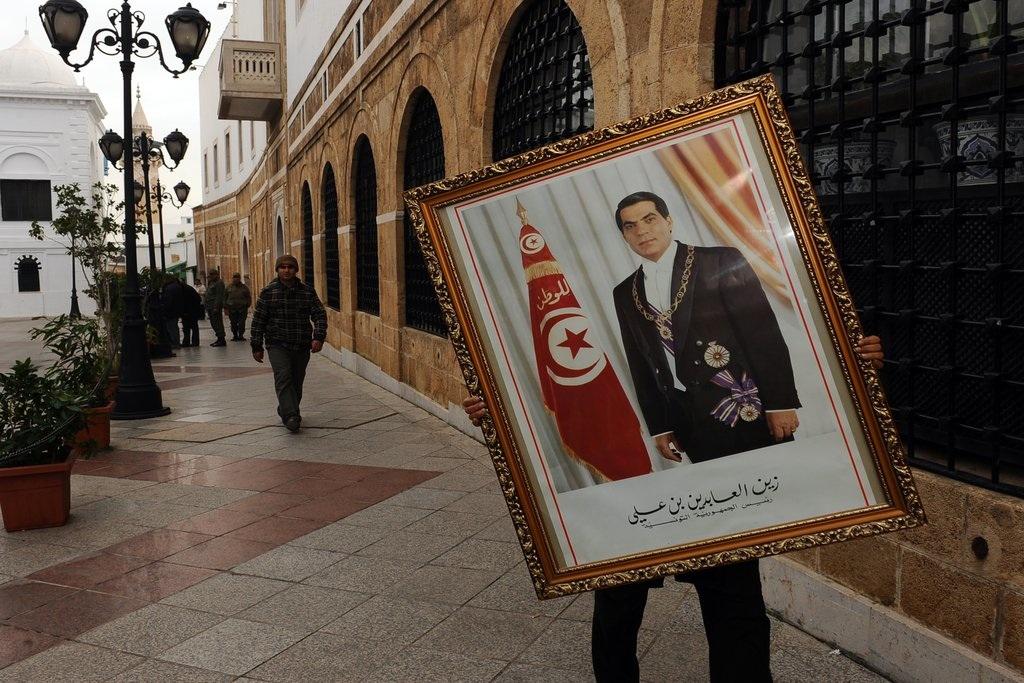Tunisia sentences Zine El Abidine Ben Ali, officials over Arab Spring killings
A Tunisian government employee carries a picture of ex-president Zine al-Abidine Ben Ali, who resigned from office after weeks of protests against poverty and corruption in January, igniting the “Arab Spring.” Ben Ali, who was convicted of charges on numerous grounds, fled to Saudi Arabia. He was in power since 1987.
A Tunisian court sentenced ousted leader Zine El Abidine Ben Ali, in absentia, to life in prison for his part in the killing of protesters during the revolution that ignited last year's Arab Spring.
Meanwhile, his former interior minister and seven security chiefs have been jailed for up to 15 years by the court in Kef, west of Tunis, after a trial lasting six months.
Former Interior Minister Rafik Belhaj Kacem, sentenced to 12 years and the chiefs were the first senior officials to be convicted in the deaths of over 300 people last year, Reuters reported.
However, other key figures saw their charges dismissed, much to the anger of victims' families, Agence France-Presse reported.
The court dropped charges against former Chief of Presidential Security Ali Seriate and the former director of Tunisia's riot police, Moncef Laadjimi, with Prosecutor Monia Bouali predicting the news would not be received well.
"I expect that people will react negatively in Kasserine, especially in the case of Moncef Laadjimi, as many people stated they had personally witnessed him coordinating killings," she said, UPI reported.
In all, the court dropped charges against 10 officials, drawing angry cries from victims' families waiting outside the court.
AFP cited lawyer Abdelkarim Maghouri as saying that they shouted, "Revenge! Revenge!" adding that "the judge could not fully read the verdict because of the ruckus."
Prosecutors had sought the death penalty for Ben Ali — living in exile in Saudi Arabia with his wife and family — specifically for ordering police to shoot protesters in Thala, Kasserine, Kairouan and Tajerouine, the website Tunisia Live reported.
His 20-year prison term — handed down for "inciting disorder" and "murdering and looting on Tunisian territory" — involved the Jan. 15, 2011, killing of four protesters in Ouardanine.
More from GlobalPost: Mubarak reportedly in 'full coma,' say Egyptian officials
At the time, security forces were also attempting to smuggle Ben Ali's nephew, Kais Ben Ali, out of the country.
"We tried to hand down a fair verdict, and nobody put any pressure on us. We were only guided by God and our own personal conviction," Judge Chokri Mejri reportedly said.
The Tunisian uprising was sparked by the self-immolation of Mohamed Bouazizi, 26, a vegetable seller from the town of Sidi Bouzid who was protesting official corruption.
His suicide set off protests across North Africa and the Middle East that toppled the seemingly unassailable regime of Hosni Mubarak in Egypt, and resulted in the death of military dictator Muammar al-Gaddafi in Libya.
In Tunisia, the result was democratic elections last October won by a moderate Islamist party.
More from GlobalPost: Tunisia declares curfew after Salafist Muslims riot to protest 'God' artwork
The story you just read is accessible and free to all because thousands of listeners and readers contribute to our nonprofit newsroom. We go deep to bring you the human-centered international reporting that you know you can trust. To do this work and to do it well, we rely on the support of our listeners. If you appreciated our coverage this year, if there was a story that made you pause or a song that moved you, would you consider making a gift to sustain our work through 2024 and beyond?
